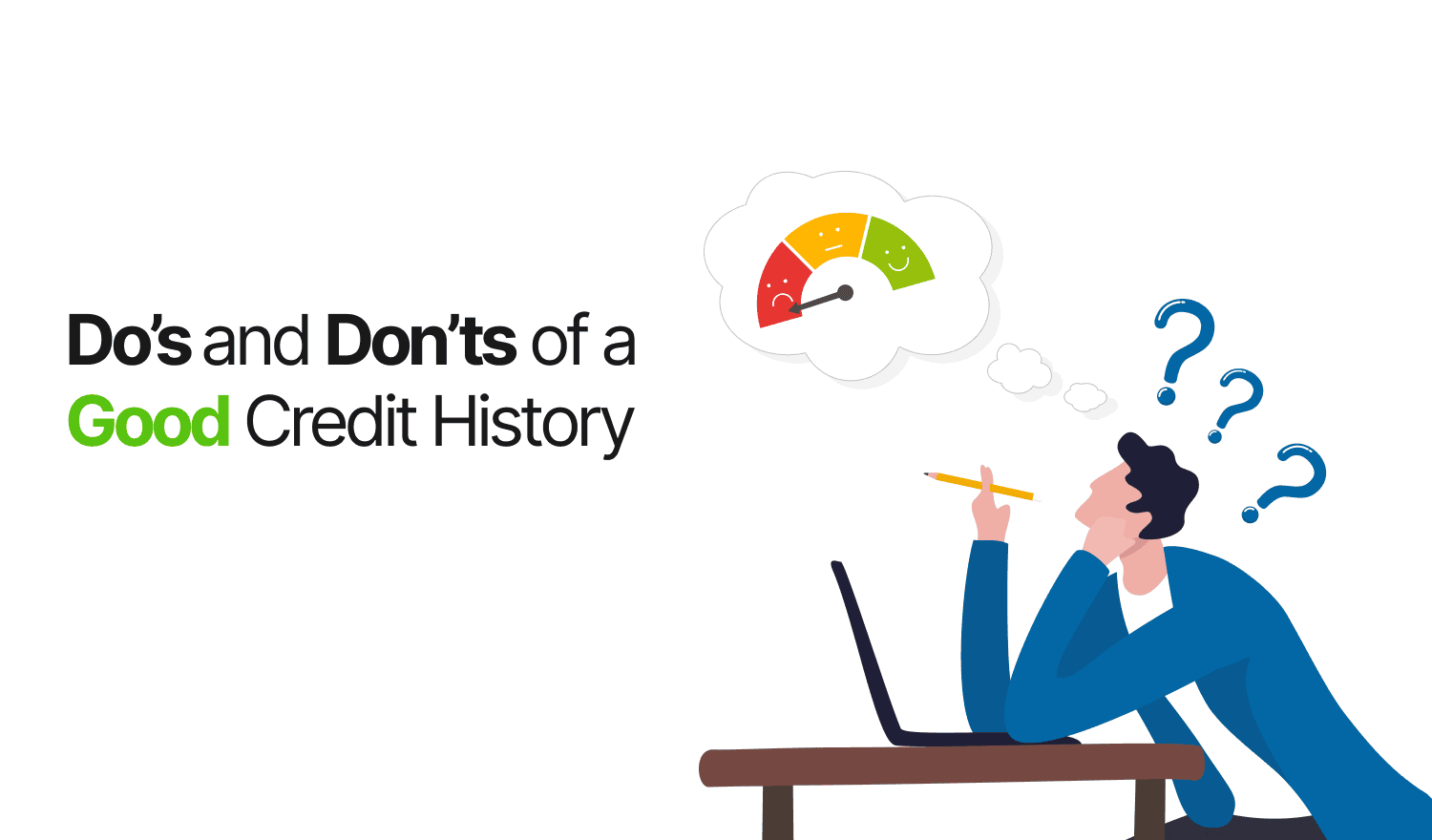Do’s and Don’ts of a Good Credit History

Last Updated : Feb. 14, 2025, 5 p.m.
Having a good credit history is essential in the approval of credit related applications. Credit history demonstrates your past credit behavior and includes your previous borrowing and repayment conduct. It is important to know your credit history and learn how it impacts your credit prospects. The more you know about your current credit prospects, the better prepared you will be to have a smoother loan application process. Let us now understand in detail what a credit history is and the do’s and don’ts for a good credit history.
Understanding Credit History in Detail
Credit history refers to all the details of the credit behavior shown by you previously. Your credit history includes outstanding balances, missed payments, defaults, and so on.
Most of the credit information is reflected in your credit report. The credit bureaus keep information about your credit history and then display it in a document called the credit report. Your credit history is an important element in deciding your credit score .
When you apply for a loan, credit card , or any other credit product, the lender will want to view your credit history. This can be done only with your permission. They will also evaluate your creditworthiness from your credit report.
The status of your credit history affects your loan application. If you have a good credit history, your credit applications will be sanctioned quickly. Whereas, if your credit score is low, then there will be a delay in the approval of your application. It also leaves you with the power to negotiate for higher loan amounts and lower interest rates.
Do’s for a Good Credit History
First, we would tell you what are the things you must do to ensure a good credit history. Some of the important ones are paying bills on time, having a good credit utilization ratio, credit mix, etc. You can look at all of them below.
Pay your Dues on Time
Make sure that you pay your outstanding dues like loan EMIs and credit card bills on time. Your repayment history accounts for up to 35% of your credit score. A timely repayment history without any defaults on your credit report shows to the lender that you are capable of repaying on time and managing your finances responsibly. Missing even a single payment can affect your credit history.
Check your Credit Report Regularly
It is also important to check your credit report regularly to keep track of the updates. Checking your credit report also helps you identify erroneous information in your credit history like duplicate accounts and active accounts which are not in your name. Once you find errors, you can raise a dispute with one of the credit bureaus and then resolve it. So, ensure to check your credit history before you apply for a loan or credit card.
Keep Your Credit Utilization Ratio within Limits
Credit utilization ratio is defined as the percentage of the total available credit limit in a month. For a good credit score, it is essential to keep this ratio within 30% or less. Spending more than the ideal credit limit shows that you are over dependent on credit. This is not preferred by lenders, and it will harm your credit history.
Maintain a Good Credit Mix
It is important to have a diverse portfolio of credit like instalment loans, mortgage loans, and revolving credit. Having a good credit mix will enhance your credit history. It is also important to have a balanced ratio between secured and unsecured credit products. Having a varied portfolio in your credit history will show to lenders that you are capable of handling different types of credit simultaneously.
Always Pay Your EMIs and Credit Card Bills in Full
Pay your EMIs and credit card bills in full. Paying only the minimum amount due often will lead to accumulation of balance. Carried over balance will attract interest rate. Over a period of time, you will be faced with a high amount of debt which will have a negative impact on your credit history. Over accumulation of balance will lead to a debt trap.
Don’ts for a Good Credit History
Now, know all those factors that you should not do if you want to have a good credit history. All of them are mentioned below. Do check them!
Don’t Close Old Accounts
Your credit history also includes old accounts from the past. Old accounts with favorable credit history reflect your financial responsibility. It demonstrates that you are capable of repaying your credit card bills and loan EMIs on time. So, closing old accounts which show your long term association with lenders impacts your credit history and credit score. Also, by closing old accounts, the average length of your credit history becomes lower. This impacts your credit score as the age of credit contributes to about 15% of your credit score.
Don’t Apply for Credit Frequently During a Short Duration
Applying for multiple credit during a short duration triggers multiple hard inquiries, which will have a negative impact on your credit history. So, have a gap of 6 months at least between applications. Also, do not apply for a credit product as soon as your application is rejected. Analyze why your application has been denied. If it has been due to your credit score or credit history, take steps to improve it and then re-apply. Also, before you apply for a credit product, understand whether you really need it and then apply for it.
Don’t Be a Guarantor to High Risk Borrowers
Before you become a guarantor to a borrower, analyze the borrower’s credit history. If he does not have a good credit history, then you are at a high risk. This is because if the primary borrower defaults on his payments, then it will impact your credit history as well. So, don’t be a guarantor to a high risk borrower.
Frequently Asked Questions (FAQs)